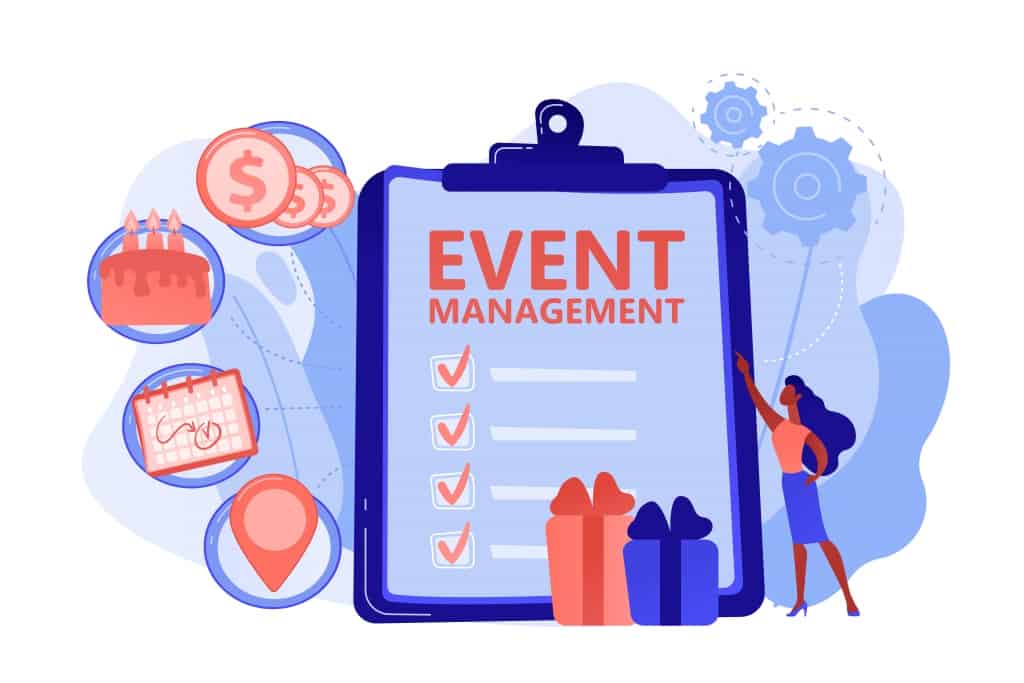Are you passionate about creating unforgettable experiences and organizing seamless events? Event management might just be the perfect path for you. As an event manager, you'll be responsible for a wide range of tasks, from planning and coordinating every detail of an event to ensuring its success.
In this blog post, we will delve into the world of event management, exploring how it works and sharing valuable tips to help you excel in this dynamic field.
Let's get started!
Table of Contents
- Understanding Event Management
- How Does Event Management Work?
- Tips For Effective Event Management
- Key Takeaways
- Frequently Asked Questions

Looking for an interactive way to heat up your event parties?.
Get free templates and quizzes to play for your next gatherings. Sign up for free and take what you want from AhaSlides!
🚀 Grab Free Account
Understanding Event Management
Event management revolves around careful planning, effective organization, and making fantastic events happen. It involves managing every aspect of an event, from the initial concept and planning stages to the final execution and post-event evaluation. And event managers will handle everything from start to finish, whether it's a corporate conference, a fun wedding, or a lively party.
They choose the perfect venue, figure out logistics like transportation and accommodations, keep track of budgets and expenses, talk with vendors and suppliers, handle all the technical stuff, and ensure the event looks great with the right decorations and layout. They also promote the event to excite people and handle registrations and check-ins.
Their goal is to make sure everything runs smoothly and that everyone, including the organizers and attendees, has a fantastic time.

How Does Event Management Work?
Event management involves various processes and considerations to ensure successful events. Here's an overview of how event management works:
1/ Organize Various Types Of Events
Event management covers many types of events. Each event type has its own requirements and goals.
- Social Events: Social events encompass weddings, birthdays, anniversaries, reunions, and other personal celebrations.
- Fundraising Events: These events are organized to raise funds for charitable causes or nonprofit organizations.
- Trade Shows and Exhibitions
- ...
2/ Event Planning
Event planning is a crucial component of event management, encompassing organizing and coordinating all the necessary elements to ensure a successful event.
It involves a series of steps and considerations to bring an event from concept to reality, including clarifying the purpose and objectives of the event to guide the planning process, budgeting, venue selection, logistics management, and more.
3/ Event Designing
Event designing is a creative aspect of event management that focuses on creating a visually appealing and engaging experience for attendees. It includes elements like theme selection, decor, lighting, stage setup, audiovisual arrangements, and overall aesthetics.
Event designers work to create a cohesive and immersive experience that aligns with the event's purpose and audience.
4/ Event Risk Management
Event risk management involves identifying and mitigating potential risks and hazards associated with an event. Therefore, a successful event cannot lack an event risk management checklist, which helps event managers proactively address potential risks, maintain safety, and ensure the event's smooth operation.

Tips For Effective Event Management
Here are valuable tips for mastering event management you should know:
1/ Start with a clear event planning checklist
A well-structured event planning checklist serves as one of your best event management guides. It helps you stay organized, saves time, and provides a systematic approach to the entire event planning process.
With a clear event planning checklist, you can easily track progress, delegate tasks, and ensure that each aspect of the event is carefully considered and executed. From defining objectives to managing logistics and promotions, a comprehensive event planning checklist is an indispensable tool that empowers you to orchestrate successful events smoothly and flawlessly.
2/ Get creative with the event game
Infusing creativity into event games can elevate your event management efforts and leave a lasting impact on attendees. Here's how getting creative with event games can benefit you:
- Enhanced Engagement: Event games captivate attendees' attention and generate excitement, resulting in higher engagement levels.
- Memorable Experiences: When games are designed with a creative twist or unique elements, they stand out in the minds of participants and contribute to the overall event experience.
- Stronger Attendee Connections: Well-designed event games allow attendees to interact, collaborate, and build connections with one another.
- Data Collection and Insights: By integrating technology or interactive elements into the games, you can gather information and gain insights that can be used for future event planning and marketing efforts.
- Differentiation in the Market: In a competitive event landscape, creative event games help you stand out from the crowd.
Remember, when incorporating event games, tailor the games to suit the event theme and objectives, and ensure they align with your overall event experience and desired outcomes.
3/ Incorporate an interactive museum experience
The interactive museum provides attendees with hands-on and immersive activities, making the event more engaging and memorable. It creates opportunities for attendees to actively participate, explore, and interact with the exhibits or installations, resulting in a lasting impact.
In addition, offering an interactive museum experience sets your event apart from others. It adds a unique element that distinguishes your event, attracting attendees who are seeking novel and engaging experiences.
4/ Simplify attendee communication at events with networking questions
Ensure seamless communication at your event by proactively assisting attendees with a list of networking questions in advance. This thoughtful gesture not only helps overcome communication barriers but also ensures attendees have engaging conversations.
By providing them with conversation starters, your event will be cherished, and positive word-of-mouth will spread like wildfire. It also can make it easier for attendees to initiate conversations, establish meaningful connections, and foster valuable networking opportunities at your event.

5/ Make the most of your business networking efforts
Business networking in event management offers numerous benefits. It allows you to establish connections with industry professionals, clients, partners, and suppliers, opening doors for future collaborations and recommendations.
By expanding your network, you can generate referrals, access new opportunities, and foster collaborations that enhance the success of your events. Participating in networking events and associations enables the exchange of industry knowledge, helping you overcome challenges and grow collectively. It also boosts your brand visibility, strengthens your reputation, and attracts more clients.
Finally, networking facilitates personal and professional growth by allowing you to learn from like-minded professionals and acquire valuable skills.
6/ Conducting post-event survey questions
Post-event survey questions allow you to gauge the overall satisfaction of attendees with the event. By collecting feedback on their experience, you can understand what aspects of the event were successful and identify areas for improvement.
Surveys can highlight any logistical issues or challenges faced by attendees, such as the registration process, venue accessibility, or event flow. This feedback enables you to make necessary adjustments and ensure a smoother experience in future events.
7/ Learn and combine with an event management company
Learning and combining your knowledge with an event management company can greatly benefit you in event management.
Working closely with an event management company provides valuable practical insights into event planning, logistics, vendor management, budgeting, and execution. You can learn firsthand how professionals handle various aspects of event management, gaining practical knowledge that you can apply to your own events.
In addition, by combining your knowledge with an event organization company, you gain access to their resources, such as event management software, templates, and industry databases. These resources can save you time and effort in your event planning, allowing you to focus on delivering exceptional experiences.
8/ Utilize interactive software
Utilizing interactive software like AhaSlides enables you to create engaging presentations with live polls, quizzes, and Q&A sessions, fostering real-time audience interaction and enhancing the attendee experience.
It adapts to different event types and remote event engagement with versatile event design templates. Incorporating interactive features elevates event management by delivering memorable experiences and boosting attendee engagement and satisfaction.

Key Takeaways
Event management is a dynamic and multifaceted discipline that requires meticulous planning, organizational skills, and attention to detail. It plays a crucial role in creating memorable and impactful experiences for individuals and organizations.
Frequently Asked Questions
What is an example of an event?
A corporate conference where industry professionals gather to network, attend keynote presentations and participate in workshops and panel discussions.
What are examples of event planning services?
Examples of event planning services include (1) Venue selection and management, (2) Budgeting and financial planning, (3) Vendor and supplier coordination, (4) Logistics and transportation management and (5) Event marketing and promotion.
What are the five roles in event management?
Five roles in event management include (1) Event Manager/Planner (2) Marketing and Communications Manager (3) Operations Manager (4) Sponsorship and Partnerships Manager (5) Volunteer Coordinator.








